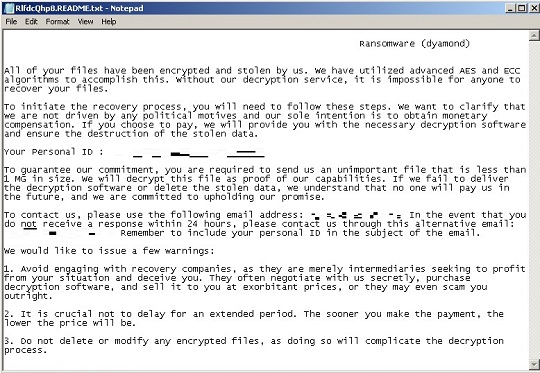Ransom.Win32.MONDDYA.THABEBD
Trojan-Ransom.BlackMatter (IKARUS)
Windows


Threat Type: Ransomware
Destructiveness: No
Encrypted: No
In the wild: Yes
OVERVIEW
This Ransomware arrives on a system as a file dropped by other malware or as a file downloaded unknowingly by users when visiting malicious sites.
It drops files as ransom note.
TECHNICAL DETAILS
Arrival Details
This Ransomware arrives on a system as a file dropped by other malware or as a file downloaded unknowingly by users when visiting malicious sites.
Installation
This Ransomware adds the following mutexes to ensure that only one of its copies runs at any one time:
- Global\{Generated hash based on GUID}
Process Termination
This Ransomware terminates the following services if found on the affected system:
- backup
- GxBlr
- GxCIMgr
- GxCVD
- GxFWD
- GxVss
- memtas
- mepocs
- msexchange
- sophos
- sql
- svc$
- veeam
- vss
Other Details
This Ransomware does the following:
- It attempts to terminate running processes using the Restart Session Manager to encrypt the associated file as such will result to the following registry modification:
- HKEY_CURRENT_USER\Software\Microsoft\RestartManager\Session0000
Owner = {hex values} - HKEY_CURRENT_USER\Software\Microsoft\RestartManager\Session0000
SessionHash = {hex values} - HKEY_CURRENT_USER\Software\Microsoft\RestartManager\Session0000
Sequence = 0x01 - HKEY_CURRENT_USER\Software\Microsoft\RestartManager\Session0000
RegFiles{number} = {file} - HKEY_CURRENT_USER\Software\Microsoft\RestartManager\Session0000
RegFilesHash = {hex values}
- HKEY_CURRENT_USER\Software\Microsoft\RestartManager\Session0000
Ransomware Routine
This Ransomware appends the following extension to the file name of the encrypted files:
- .RlfdcQhp8
It drops the following file(s) as ransom note:
- {Encrypted Directory}\RlfdcQhp8.README.txt

SOLUTION
Step 1
Trend Micro Predictive Machine Learning detects and blocks malware at the first sign of its existence, before it executes on your system. When enabled, your Trend Micro product detects this malware under the following machine learning name:
-
Troj.Win32.TRX.XXPE50FFF077
Step 2
Before doing any scans, Windows 7, Windows 8, Windows 8.1, and Windows 10 users must disable System Restore to allow full scanning of their computers.
Step 3
Scan your computer with your Trend Micro product to delete files detected as Ransom.Win32.MONDDYA.THABEBD. If the detected files have already been cleaned, deleted, or quarantined by your Trend Micro product, no further step is required. You may opt to simply delete the quarantined files. Please check the following Trend Micro Support pages for more information:
Step 4
Restore encrypted files from backup.
Did this description help? Tell us how we did.


